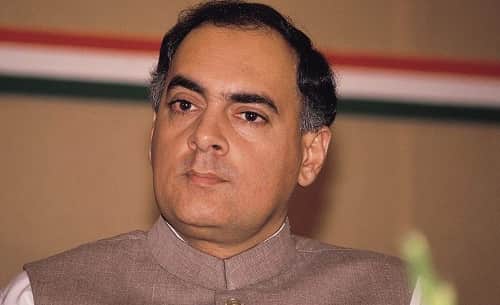Born in one of the most influential and prominent political family of India, Rajiv Gandhi turned into the third generation in his Nehru-Gandhi family to end up becoming the Prime Minister of India. Pandit Jawaharlal Nehru, his maternal grandfather, and Mrs. Indira Gandhi, his mother, both served as Prime Ministers of India in the past. As a matter of fact, he turned out to be the youngest Prime Minister of India at merely 40 years of age. Rajiv Gandhi laid the foundation stone for the modern India and is regarded as the architect of Digital India.
He launched a number of developmental projects and these included the major enlargement of the telecom segment and the upgrade of national policy of education in the nation.
Early Life and Education
While being in England, Rajiv met Sonia Mainoat the Cambridge University. She later came to be known as Sonia Gandhi and she hailed from Italy. He got married to Sonia Gandhi in the year 1968 and the couple had two children – Rahul Gandhi and Priyanka Gandhi (Now Priyanka Gandhi Vadra). After his arrival from the United Kingdom, Rajiv Gandhi displayed slightest enthusiasm for governmental issues and centred onto turning into an expert pilot. He gained the licence for commercial pilot and worked for Indian Airlines as a pilot starting in the year 1968.
Political Career
Entering Politics
As mentioned, Rajiv had no tendency to pursue the tradition of his family to join governmental issues as a politician. It was his younger sibling Sanjay Gandhi who was being prepped to take up the steerages of the political inheritance. However, the unexpected passing of Sanjay Gandhi in a plane accident changed the destiny of Rajiv Gandhi as well. The senior members of the Indian National Congress moved towards Rajiv Gandhi in order to influence him to join legislative issues however Rajiv was hesitant and held his word of not joining politics. Sonia Gandhi, his wife, additionally supported Rajiv’s situation of not going into politics. Be that as it may, after steady requests and a lot of insistence from his mother Indira Gandhi, he chose to contest and enter politics.
His entry to politics was reprimanded by numerous individuals in the press, by opposition and the public. They took the entry of Nehru-Gandhi scion into government as a constrained inherited participation. Inside a couple of months of his decision as a Member of Parliament from Uttar Pradesh’s Amethi region, Rajiv Gandhi gained immense influence and turned into an imperative political guide to Indira Gandhi. He was additionally chosen as the general secretary of the All-India Congress Committee and in this way turned into becoming the leader of the Youth Congress. Youth Congress is a wing of Indian National Congress and Rajiv’s son – Rahul Gandhi was also selected as General Secretary for the All-India Congress Committee in the year 2007. He was also looking after the Indian Youth Congress as well as NSUI.
Role as Prime Minister of India
Following Indira Gandhi’s sad demise on 31st of October 1984, wherein she was assassinated by her security guards at her residence and office at New Delhi, Rajiv Gandhi was sworn in as the Prime Minster of India. Riding high on the catastrophe Gandhi family went through the Congress Party saw an avalanche triumph in the parliament after elections. The party won 401 seats out of 552 seats in LokSabha, a case of absolute majority.
Monetary Policies
The monetary strategies embraced by Rajiv Gandhi were unique in relation to his forerunners like Jawaharlal Nehruand Indira Gandhi. He presented strategies that leaned on swift changes of the current monetary agenda of the nation which depended on protectionism on the lines of Soviet model. These changes cleared route for the broader linearization attempts of the economy in the year 1991. Another important and major decision Rajiv Gandhi made amid his residency as Prime Minister was to get rid of the quota Raj and license. He lessened tax on technological industry, improved import policies identified with media transmission or telecommunication, commercial airline carrier and defence. He emphasized on presentation of contemporary mechanical advances in different segments, and in this manner modernizing various kind of industries to pull in higher foreign investment in the Indian economy.
Household Policies
He made a lot of efforts to decrease the existing culture of “Red Tapism” in the administration. The financial and economic processes had the aim of empowering the foundation of the privatised sector. In the year 1986, Rajiv Gandhi declared a “national education policy” in order to modernize and extend advanced education programs crosswise over India. He brought about a transformation the domain of telecommunication and information technology. The thought prompted establishment of the Mahanagar Telephone Nigam Limited, famously called as MTNL.
Rajiv Gandhi was the brain behind transcending telecommunication services to the rustic and rural part of India or “India in obvious sense”. As the Prime Minister of India, Rajiv Gandhi attempted to dispose of the criminal and corrupt members inside the Indian National Congress party. In regards to the Shah Bano case, he drove the Government to pass the Muslim Women Act in the year 1986 – this was about Protection of Rights on Divorce. This was an inversion of the sentence as ruled out by the Supreme Court of India. The decision of the Government to maintain Islamic arrangements that were uncalled for to ladies, made it appear “retrogressive obscurantism for short term minority populism”.
Foreign Policies
Conflicting with the conventional communism, Rajiv Gandhi chose to enhance the two-sided associations with the United States of America and in this way extended the scientific and financial collaboration with the nation. A resuscitated foreign policy, stressing on the monetary advancement and information and technology led to bringing India nearer to the Western countries.
Serving as the Prime Minister of the nation, Rajiv Gandhi guaranteed more grounded financial ties with the United States. He advanced the Gandhian philosophy of peacefulness at the United Nations General Assembly by declining to seam the Nuclear Weapon bandwagon and vocalizing for an “Atomic Weapon Free and Non-Violent World Order”. He chose to loan his assistance in managing residential issues of a few neighbouring nations. In the year 1988, Maldives confronted an overthrow and they looked for Rajiv Gandhi’s assistance. He promptly requested the Indian Army in an activity code-called as Cactus. Amid the Sri Lankan Civil War, he sent the Indian Peace Keeping Force to the nation in order to secure the citizens of Sri Lanka.
Demise
Being the leader of the biggest democracy on the planet, this most youthful Prime Minister of India, did all the best in his power to enhance the condition of India in each and every domain incorporating two-sided relations with other nations, for example, Sri Lanka and the United States. He also attempted to go about as a peacemaker between the Sri Lankan government and LTTE (Liberation Tigers of Tamil Eelam), and as an outcome, he paid with his life.
On 21st of May, 1991, when he was holding campaigns in Tamil Nadu in favour of the LokSabha Congress competitor Mrs. Margatham Chandrrasekhar, he was killed by one of the LTTE suicide bombers. On his way towards the dais, in Sriperambudur, Rajiv Gandhi was wreathed by numerous supporters of the Congress and well-wishers.
At about 10 pm, the killer welcomed him and touched his feet. She at that point detonated a RDX loaded belt placed under her dress. The demonstration of savagery was purportedly done by the Liberation Tigers of Tamil Eelam (LTTE), in striking back to the association of Indian Peace-keeping Force (IPKF) in Sri Lanka.
“Veer Bhumi” is built in New Delhi as Rajiv Gandhi’s memorial. After death he was granted with the most astounding civilian award Bharat Ratna by the Indian Government.
Interesting facts about Rajiv Gandhi
=> Rajiv Gandhi was just 3 years of age when India ended up autonomous and his maternal grandfather Jawaharlal Nehru turned into the first and foremost Prime Minister of free India. Rajiv Gandhi’s named as Rajiv in light of the fact that the name of Jawaharlal Nehru’s better half was Kamala which implies goddess Lakshmi and the word “Rajiv” implies Kamal or Lotus flower and Lotus is utilized to venerate goddess Lakshmi.
=> Rajiv Gandhi spent most of his early childhood days with Jawaharlal Nehru at Murthy House, where his mother Indira Gandhi served her father informally as personal assistant.
=> Rajiv Gandhi was exceptionally intrigued by music. He preferred Hindustani classical and Western and modern music. He additionally had an enthusiasm for tuning in to radio and photography. Among all of his side interests being a Pilot was his greatest fixation. In this way, he went to Delhi and undertook pilot training from Flying Club and then he began working in Indian Airlines as a professional commercial pilot in the year 1970. This demonstrates that he was not inspired by politics and had no interest even if he belonged to the famous Nehru-Gandhi family.
=> Rajiv Gandhi was a very powerful yet a simple identity. Before taking any kind of decision he would generally have a discussion with his party. He drove the nation towards innovation, energized youth and established schools and so forth.
=> His aim was to keep up solidarity in the nation and the principle target of him was the development of the India of twenty-first century. Indeed, his enemy of defilement and nepotism position earned him the epithet “Mr Clean”.

